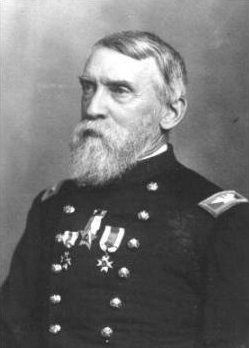Charles Champion Gilbert facts for kids
Quick facts for kids
Charles Champion Gilbert
|
|
|---|---|
 |
|
| Born | March 1, 1822 Zanesville, Ohio, U.S. |
| Died | January 17, 1903 (aged 80) Baltimore, Maryland, U.S. |
| Place of burial | |
| Allegiance | Union |
| Service/ |
Union Army |
| Years of service | 1846–1886 |
| Rank | |
| Unit | 3rd U.S. Infantry 1st U.S. Infantry 19th U.S. Infantry 28th U.S. Infantry |
| Commands held | Army of Kentucky III Provisional Cors 10th Provisional Division, AotO 7th U.S. Infantry 17th U.S. Infantry |
| Battles/wars | |
| Relations | Samuel A. Gilbert (brother) Cass Gilbert (nephew) |
| Other work | Asstistant Professor of Geography, History and Ethics at USMA West Point |
| Signature | |
Charles Champion Gilbert (born March 1, 1822 – died January 17, 1903) was an important officer in the United States Army. He served during two major conflicts: the Mexican–American War and the American Civil War.
Contents
Early Life and Military Training
Charles Champion Gilbert was born in Zanesville, Ohio. He attended the West Point military school. He graduated in 1846, which was a very famous class. Many of his classmates later became generals during the Civil War. These included well-known figures like George B. McClellan and Stonewall Jackson.
Serving in the Mexican-American War
After graduating, Gilbert joined the army. He fought in the Mexican–American War, which was a conflict between the United States and Mexico. He took part in battles at Veracruz and Mexico City. After the war, he spent two years serving in Texas.
Teaching and Frontier Duty
In 1850, Gilbert returned to West Point. He became an Assistant Professor, teaching subjects like geography and history. He was promoted to first lieutenant. In 1855, he became a captain. He then went back to Texas for duty on the frontier. This involved fighting against Native American tribes.
Civil War Service
Beginning of the War
When the American Civil War began, Gilbert was in charge of a military post called Fort Cobb, Oklahoma. He soon rejoined his main army unit. He fought in the Battle of Wilson's Creek, where he was wounded. Later, he became an Inspector General for the Army of the Ohio. This role involved checking on the army's readiness. He served in this role during the Battle of Shiloh and the Siege of Corinth.
Becoming a Major General
During a major Confederate attack, a Union general named William "Bull" Nelson was wounded. His army, the Army of Kentucky, was badly hurt. The commander, Horatio G. Wright, needed a new leader. Two other generals refused the job. So, Wright chose Gilbert to take over. Gilbert was made an acting Major General. This meant he had the rank temporarily.
A few days later, President Abraham Lincoln officially promoted Gilbert to brigadier general of U.S. Volunteers. This was a lower rank than acting major general. However, his acting major general rank helped him get a corps command. A corps is a very large military unit.
The Battle of Perryville
Gilbert was put in charge of the Army of Kentucky. This army was later renamed the III Provisional Corps. A week later, Gilbert's troops fought in the Battle of Perryville. His soldiers successfully stopped Confederate attacks. They even pushed a Confederate brigade back through Perryville.
However, some people criticized Gilbert. They said he was too slow during the battle. Many soldiers in his corps also disliked him. They felt he was too strict.
Gilbert's promotion to brigadier general was not approved by the Senate. This meant his rank expired in March 1863. He left the volunteer service and returned to the regular army. He became a Major in the 19th U.S. Infantry. He also received honorary promotions to lieutenant colonel and colonel.
Later Assignments
After the Battle of Perryville, the Union army was reorganized. Gilbert did not have a permanent command for a while. He led the 10th (Provisional) Division in Tennessee. This unit fought in the Battle of Harpeth River. In July 1863, he was moved to administrative duties in the East. He served in Philadelphia, Pennsylvania, and later in Hartford, Connecticut, for the rest of the war.
After the War
After the Civil War ended, Gilbert continued to serve on the frontier. He was part of the 28th U.S. Infantry and 7th U.S. Infantry Regiments. He retired from the army in 1886. At that time, he was the Commanding Officer of the 17th U.S. Infantry, holding the rank of colonel.
Charles Champion Gilbert passed away in Baltimore, Maryland, on January 17, 1903. He was buried in Cave Hill Cemetery in Louisville, Kentucky. His brother, Samuel A. Gilbert, was also a Union general. Charles was also the uncle of famous architect Cass Gilbert.
Images for kids
See also
- List of American Civil War generals (Union)
 | Calvin Brent |
 | Walter T. Bailey |
 | Martha Cassell Thompson |
 | Alberta Jeannette Cassell |

